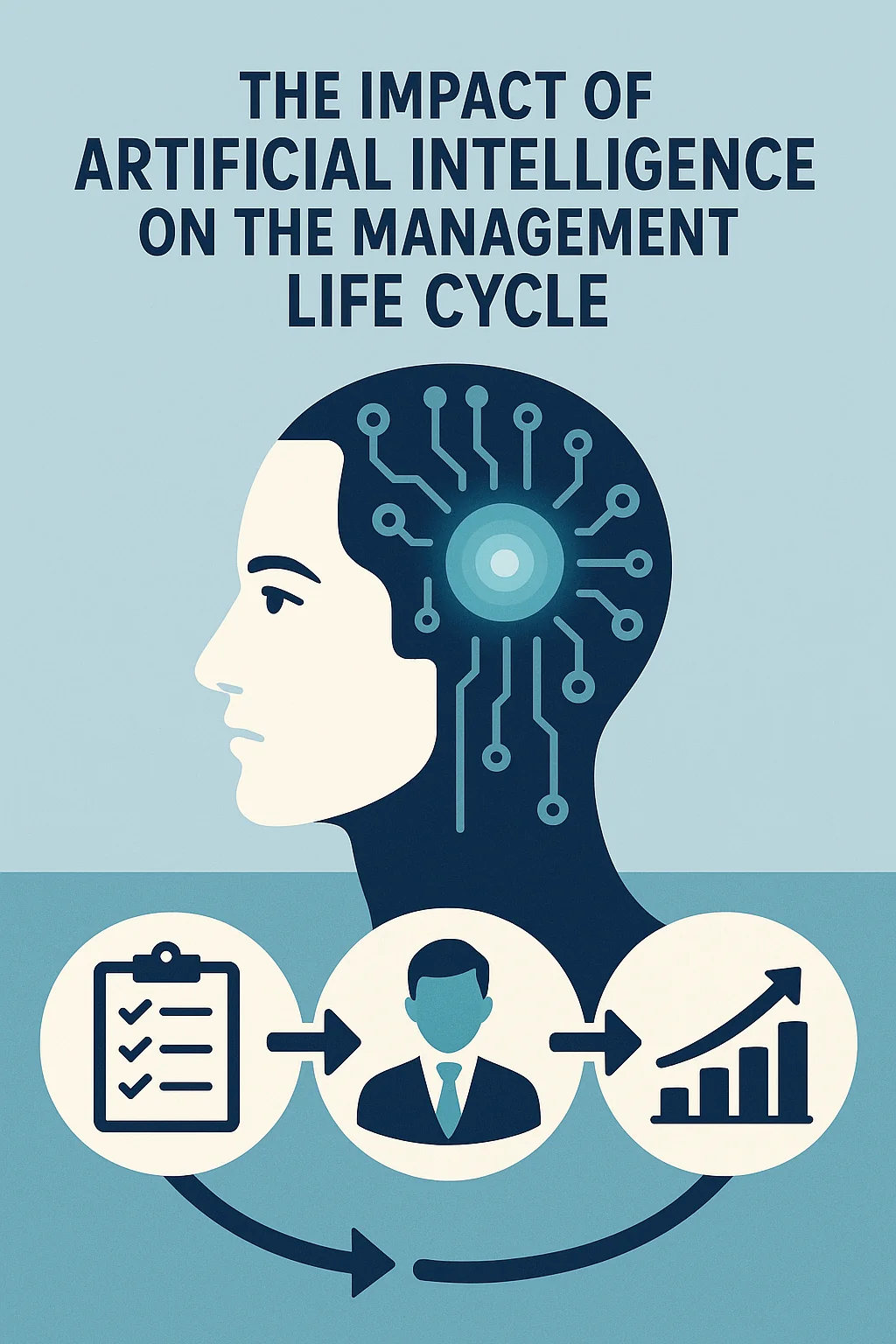Introduction to the Management Life Cycle
The management life cycle serves as a crucial framework that guides projects from conception to completion. Understanding this life cycle is essential for project managers and tech enthusiasts alike, especially as artificial intelligence (AI) continues to influence and enhance project management practices.
Definition of the Management Life Cycle
The management life cycle refers to the structured process that project managers follow to ensure that projects are completed successfully. It encompasses a series of phases that provide a roadmap for managing projects effectively. This life cycle is designed to facilitate the organization, execution, and evaluation of projects, ensuring that they meet their objectives within the constraints of time, budget, and resources.
Overview of Its Phases
The management life cycle is typically divided into five key phases:
- Initiation: This is the first phase where the project is defined and authorized. Key activities include identifying project stakeholders, establishing project goals, and conducting feasibility studies. This phase sets the foundation for the entire project.
- Planning: In this phase, detailed planning takes place. Project managers develop a comprehensive project plan that outlines the scope, schedule, resources, and budget. Risk management strategies are also formulated to address potential challenges that may arise during the project.
- Execution: This phase involves the actual implementation of the project plan. Project teams carry out the tasks defined in the planning phase, and project managers coordinate resources, manage team dynamics, and ensure that the project stays on track.
- Monitoring: Concurrent with execution, the monitoring phase involves tracking the project’s progress against the plan. Key performance indicators (KPIs) are used to assess whether the project is meeting its objectives. This phase allows for adjustments to be made in real-time to address any deviations from the plan.
- Closure: The final phase of the management life cycle is closure, where the project is formally completed. This includes finalizing all activities, obtaining stakeholder approval, and conducting a post-project evaluation to identify lessons learned. Proper closure ensures that all project deliverables are met and that the project is documented for future reference.
Importance of Effective Management Life Cycle in Project Success
An effective management life cycle is vital for the success of any project. It provides a structured approach that helps project managers:
- Enhance Communication: Clear phases facilitate better communication among stakeholders, ensuring everyone is aligned with project goals and progress.
- Manage Risks: By identifying potential risks early in the planning phase, project managers can develop strategies to mitigate them, reducing the likelihood of project failure.
- Optimize Resources: A well-defined life cycle allows for efficient allocation and utilization of resources, ensuring that projects are completed within budget and on time.
- Improve Quality: Continuous monitoring and evaluation throughout the project help maintain quality standards and ensure that deliverables meet stakeholder expectations.
Understanding Artificial Intelligence in Project Management
Artificial Intelligence (AI) is revolutionizing various industries, and project management is no exception. As project managers seek to enhance efficiency and effectiveness, understanding AI’s role becomes crucial. This section delves into the definition of AI, current trends in its adoption within project management, and the benefits it brings to optimizing project outcomes.
Definition of Artificial Intelligence
Artificial Intelligence refers to the simulation of human intelligence processes by machines, particularly computer systems. These processes include:
- Learning: The ability to acquire information and rules for using it.
- Reasoning: The capability to use rules to reach approximate or definite conclusions.
- Self-correction: The ability to improve performance based on past experiences.
AI can be categorized into various forms, including:
- Machine Learning (ML): Algorithms that allow computers to learn from and make predictions based on data.
- Natural Language Processing (NLP): The ability of machines to understand and interpret human language.
- Robotic Process Automation (RPA): Technology that automates routine tasks through software robots.
These forms of AI are increasingly being integrated into project management tools and practices, enhancing decision-making and operational efficiency.
Current Trends in AI Adoption within Project Management
The adoption of AI in project management is on the rise, driven by the need for more efficient processes and data-driven decision-making. Key trends include:
- Predictive Analytics: Project managers are leveraging AI to analyze historical data and predict future project outcomes, enabling proactive risk management and resource allocation.
- Automated Reporting: AI tools are streamlining the reporting process by automatically generating status updates and performance metrics, saving time and reducing human error.
- Enhanced Collaboration Tools: AI-powered platforms are facilitating better communication and collaboration among project teams, ensuring that all members are aligned and informed.
- Resource Optimization: AI algorithms are being used to optimize resource allocation, ensuring that the right skills are matched to the right tasks at the right time.
These trends indicate a significant shift towards data-driven project management, where AI plays a central role in enhancing productivity and effectiveness.
Benefits of AI in Optimizing Project Outcomes
The integration of AI into project management practices offers numerous benefits, including:
- Improved Decision-Making: AI provides project managers with insights derived from data analysis, enabling more informed and timely decisions.
- Increased Efficiency: By automating routine tasks, AI frees up project managers to focus on strategic planning and stakeholder engagement.
- Enhanced Risk Management: AI tools can identify potential risks early in the project lifecycle, allowing teams to implement mitigation strategies proactively.
- Better Resource Management: AI helps in accurately forecasting resource needs, reducing waste, and ensuring optimal utilization of team members and materials.
AI’s Role in Each Phase of the Management Life Cycle
Artificial Intelligence (AI) is revolutionizing project management by enhancing efficiency, accuracy, and decision-making across various phases of the management life cycle. Here’s how AI is shaping each stage:
1. Initiation
In the initiation phase, AI plays a crucial role in stakeholder analysis and project feasibility assessments. By utilizing AI algorithms, project managers can analyze vast amounts of data to identify key stakeholders, understand their interests, and assess the potential success of a project. AI tools can evaluate historical data and market trends, providing insights that help in making informed decisions about project viability.
2. Planning
During the planning phase, AI tools significantly enhance resource allocation, risk assessment, and scheduling. AI can analyze past project data to predict resource needs and optimize allocation, ensuring that the right resources are available at the right time. Additionally, AI-driven risk assessment tools can identify potential risks based on historical data and current project parameters, allowing project managers to develop more effective mitigation strategies. AI can also assist in creating realistic schedules by analyzing dependencies and resource availability, leading to more efficient project timelines.
3. Execution
In the execution phase, AI facilitates the automation of tasks and real-time progress tracking. AI-driven tools can automate repetitive tasks, freeing up project managers and team members to focus on more strategic activities. Furthermore, AI provides real-time insights into project progress, enabling teams to make data-driven adjustments as needed. This capability enhances collaboration and ensures that projects stay on track, even when unexpected challenges arise.
4. Monitoring
The monitoring phase benefits from AI through performance analytics and predictive maintenance. AI systems can continuously analyze project performance metrics, providing insights into areas that may require attention. Predictive analytics can forecast potential issues before they become critical, allowing project managers to take proactive measures. This not only improves project outcomes but also enhances overall team performance by ensuring that resources are utilized effectively.
5. Closure
Finally, in the closure phase, AI can be leveraged for project evaluations and lessons learned documentation. AI tools can analyze project data to assess outcomes against initial goals, providing valuable insights into what worked well and what didn’t. This analysis helps in documenting lessons learned, which can be invaluable for future projects. By automating the evaluation process, AI ensures that critical insights are captured and shared, fostering a culture of continuous improvement within organizations.
Benefits of Integrating AI in the Management Life Cycle
The integration of Artificial Intelligence (AI) into the management life cycle of project management is revolutionizing how projects are planned, executed, and monitored. Here are some key benefits that highlight the advantages of implementing AI in project management practices:
- Enhanced Decision-Making Through Data-Driven Insights: AI systems can analyze vast amounts of data quickly and accurately, providing project managers with actionable insights. By leveraging predictive analytics, AI can help identify trends and patterns that inform better decision-making, allowing managers to make informed choices that align with project goals and stakeholder expectations.
- Increased Efficiency and Reduced Human Error: AI automates repetitive tasks, such as scheduling, resource allocation, and progress tracking, which significantly increases operational efficiency. By minimizing manual input, AI reduces the likelihood of human error, ensuring that project data is more accurate and reliable. This efficiency allows project teams to focus on strategic tasks rather than getting bogged down by administrative duties.
- Improved Risk Management and Forecasting Capabilities: AI enhances risk management by providing tools that can predict potential project risks based on historical data and current project parameters. Machine learning algorithms can assess various risk factors and suggest mitigation strategies, enabling project managers to proactively address issues before they escalate. This capability not only improves project outcomes but also fosters a culture of risk awareness within teams.
- Streamlined Communication and Collaboration Among Project Teams: AI-powered tools facilitate better communication and collaboration among project stakeholders. Chatbots and virtual assistants can manage inquiries and provide real-time updates, ensuring that all team members are on the same page. Additionally, AI can analyze communication patterns to identify bottlenecks or misunderstandings, allowing teams to address these issues promptly and maintain project momentum.
Challenges and Considerations in Implementing AI
The integration of Artificial Intelligence (AI) into the management life cycle of project management presents numerous opportunities for efficiency and innovation. However, it also introduces several challenges that organizations must navigate to successfully adopt these advanced technologies. Here are some key hurdles to consider:
- Resistance to Change from Team Members: One of the most significant challenges in implementing AI is the resistance from team members who may be apprehensive about new technologies. Employees often fear that AI could replace their jobs or alter their roles significantly. This resistance can lead to a lack of engagement with AI tools, ultimately hindering the potential benefits that AI can bring to project management practices. To overcome this, organizations should foster a culture of openness and communication, emphasizing the supportive role of AI in enhancing human capabilities rather than replacing them.
- Data Privacy and Security Concerns: The use of AI in project management often involves handling large volumes of sensitive data. This raises critical concerns regarding data privacy and security. Organizations must ensure that they comply with relevant regulations and standards, such as GDPR, to protect personal and sensitive information. Implementing robust security measures and transparent data handling practices is essential to build trust among team members and stakeholders.
- Integration with Existing Project Management Tools and Systems: Another challenge lies in the integration of AI solutions with existing project management tools and systems. Many organizations rely on a variety of software applications for different aspects of project management, and ensuring that AI tools can seamlessly integrate with these systems is crucial. This may require significant investment in technology and resources, as well as careful planning to avoid disruptions in ongoing projects.
- Need for Training and Upskilling Project Managers: The successful implementation of AI in project management necessitates that project managers and their teams are adequately trained to use these new tools effectively. Upskilling is essential not only to understand how to leverage AI for better decision-making and efficiency but also to manage the change process within the team. Organizations should invest in training programs that equip project managers with the necessary skills to navigate AI technologies, ensuring they can lead their teams confidently in this evolving landscape.
Future Trends: The Evolution of AI in Project Management
As artificial intelligence (AI) continues to advance, its integration into project management practices is becoming increasingly significant. This section explores the emerging AI technologies, their potential applications, and how they are expected to shape the future of project management, particularly in remote and hybrid environments.
Emerging AI Technologies and Their Potential Applications
- Natural Language Processing (NLP): NLP can enhance communication within project teams by automating the generation of reports and summarizing meeting notes. This technology allows project managers to focus on strategic decision-making rather than administrative tasks.
- Machine Learning (ML): ML algorithms can analyze historical project data to identify patterns and predict project outcomes. This capability enables project managers to make data-driven decisions, improving the accuracy of project timelines and resource allocation.
- Robotic Process Automation (RPA): RPA can automate repetitive tasks such as data entry and status updates, freeing up team members to concentrate on more complex and creative aspects of project management. This leads to increased efficiency and reduced human error.
- AI-Powered Analytics: Advanced analytics tools powered by AI can provide real-time insights into project performance, helping managers to identify risks and opportunities early. This proactive approach can significantly enhance project success rates.
Predictions for AI-Driven Project Management Tools
- Personalized Project Management Software: Future project management tools are expected to leverage AI to offer personalized experiences based on user behavior and preferences. This could include tailored dashboards, customized notifications, and adaptive workflows that evolve with the project’s needs.
- Enhanced Collaboration Platforms: AI will likely play a crucial role in developing collaboration tools that facilitate seamless communication among team members, regardless of their location. Features such as intelligent chatbots and virtual assistants could streamline interactions and provide instant support.
- Predictive Project Management: Tools that utilize predictive analytics will become commonplace, allowing project managers to foresee potential challenges and adjust plans accordingly. This shift towards a more anticipatory management style will enhance agility and responsiveness in project execution.
The Role of AI in Remote and Hybrid Project Management Environments
- Facilitating Remote Collaboration: AI technologies can bridge the gap in remote and hybrid work settings by providing tools that enhance virtual collaboration. For instance, AI-driven video conferencing tools can analyze participant engagement and suggest optimal meeting times based on team availability.
- Monitoring Team Performance: AI can assist in tracking team productivity and engagement levels in remote settings. By analyzing data from various sources, AI can provide insights into team dynamics and suggest interventions to improve morale and performance.
- Resource Optimization: In hybrid environments, AI can help project managers optimize resource allocation by analyzing workload distribution and team availability. This ensures that projects are adequately staffed and that team members are not overburdened.
Conclusion
The integration of Artificial Intelligence (AI) into the management life cycle of project management is proving to be a transformative force that reshapes traditional practices. Here are the key insights regarding AI’s impact:
- Transformative Impact: AI technologies are revolutionizing how project managers plan, execute, and monitor projects. By automating routine tasks, providing predictive analytics, and enhancing decision-making processes, AI allows project teams to focus on strategic initiatives rather than administrative burdens. This shift not only increases efficiency but also improves project outcomes by enabling more informed and timely decisions.
- Exploration of AI Tools: Project managers are encouraged to actively explore and adopt AI tools that can enhance their workflows. From AI-driven project management software that offers real-time insights to machine learning algorithms that predict project risks, the tools available today can significantly streamline operations and improve collaboration among team members. Embracing these technologies can lead to a competitive advantage in an increasingly complex project landscape.
- Importance of Adaptability: As the project management field continues to evolve with technological advancements, adaptability becomes crucial. Project managers must be willing to embrace change and continuously update their skills to leverage AI effectively. This adaptability not only fosters innovation but also ensures that project teams remain resilient and responsive to the dynamic demands of the industry.
In summary, the impact of AI on the management life cycle is profound, offering numerous opportunities for enhancement and growth. By embracing AI tools and fostering a culture of adaptability, project managers can navigate the challenges of a tech-driven landscape and lead their teams to success.
Find out more about Shaun Stoltz https://www.shaunstoltz.com/about/.
This post was written by an AI and reviewed/edited by a human.



